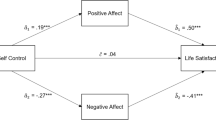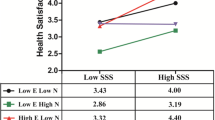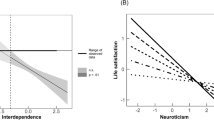Abstract
Studies have shown that perceived control has a positive a relationship with life satisfaction. However, less is known about the underlying processes that may mediate or moderate this relationship. The present study is the first to examine whether envy mediates or self-esteem moderates this effect. A total of 1685 Chinese undergraduates completed revised versions of the Perceived Control, Envy, Self-esteem, and Life Satisfaction Scales. As predicted, the relationship between perceived control and life satisfaction was partially mediated by envy. In addition, both the effect of perceived control on life satisfaction and mediating effect of envy were moderated by self-esteem. Specifically, the effect of perceived control on life satisfaction was stronger in individuals with higher levels of self-esteem, and the mediating effect of envy was stronger in those with lower self-esteem. These findings not only contribute to a better understanding of how and when perceived control increases life satisfaction, but also suggest a potential way of enhancing individual happiness by increasing the positive effects of perceived control.



Similar content being viewed by others
References
Appel, H., Crusius, J., & Gerlach, A. L. (2015). Social comparison, envy, and depression on Facebook: A study looking at the effects of high comparison standards on depressed individuals. Journal of Social & Clinical Psychology, 34(4), 277–289.
Andrew, N., & Meeks, S. (2016). Fulfilled preferences, perceived control, life satisfaction, and loneliness in elderly long-term care residents. Aging & Mental Health, 22(2), 1–7.
Bandura, A. (1977). Self-efficacy: Toward a unifying theory of behavioral change. Psychological Review, 84, 191–215.
Barlow, D. H. (2002). Anxiety and its disorders: The nature and treatment of anxiety and panic. Guilford press.
Baumeister, R. F., Campbell, J. D., Kruegger, J. I., & Vohs, K. D. (2003). Does high self-esteem cause better performance, interpersonal success, happiness, or healthier lifestyles? Psychological Science in the Public Interest, 4(1), 1–44.
Briki, W. (2019). Harmed trait self-control: Why do people with a higher dispositional malicious envy experience lower subjective wellbeing? A cross-sectional study. Journal of Happiness Studies, 20, 523–540.
Cai, H., Wu, Q., & Brown, J. D. (2010). Is self-esteem a universal need? Evidence from the People's Republic of China. Asian Journal of Social Psychology, 12(2), 104–120.
Cai, Z., Guan, Y., Li, H., Shi, W., Guo, K., Liu, Y., & Fang, Z. (2015). Self-esteem and proactive personality as predictors of future work self and career adaptability: An examination of mediating and moderating processes. Journal of Vocational Behavior, 86, 86–94.
Chorpita, B. F., & Barlow, D. H. (1998). The development of anxiety: The role of control in the early environment. Psychological Bulletin, 124(1), 3–21.
Chow, T. S., & Wan, H. Y. (2017). Is there any'Facebook depression’? Exploring the moderating roles of neuroticism, Facebook social comparison and envy. Personality & Individual Differences, 119, 277–282.
Crusius, J., & Lange, J. (2014). What catches the envious eye? Attentional biases within malicious and benign envy. Journal of Experimental Social Psychology, 55, 1–11.
Crusius, J., & Lange, J. (2016). How do people respond to threatened social status? Moderators of benign versus malicious envy. Envy at work and in organizations: Research, theory, and applications, 85-110.
Diener, E., & Diner, M. (1995). Cross-cultural correlates of life satisfaction and self-esteem. Journal of Personality and Social Psychology, 68(4), 653–663.
Diener, E., Emmons, R. A., Larsen, R. J., & Griffin, S. (1985). The satisfaction with life scale. Journal of Personality Assessment, 49, 71–75.
Duy, B., & Yıldız, M. A. (2017). The mediating role of self-esteem in the relationship between optimism and subjective well-being. Current Psychology., 38, 1456–1463.
Ebulum, G. C., & Chidiobi, R. U. (2016). Resilience, gender and age as predictors of satisfaction with academic major among university undergraduates. International Journal of Research in Engineering and Social Sciences, 6(04), 13–23.
Eklund, M., & Bäckström, M. (2007). The role of perceived control for the perception of health by patients with persistent mental illness. Scandinavian Journal of Occupational Therapy, 13(4), 249–256.
Espín, A. M., Moreno-Herrero, D., Sánchez-Campillo, J., & Martín, J. A. (2015). Do envy and compassion pave the way to unhappiness? Social preferences and life satisfaction in a spanish city. Journal of Happiness Studies, 19, 1–27.
Guo,R., Ouyang, Y.X., Deng Y.Q., Feng, S.S., He W. B., Liu, H.H. (2013). Reliability and validity of the Chinese version of dispositional envy scale in Chinese college students [in Chinese]. China Journal of Health Psychology. 21(5).701–703.
Foster, G. (1972). The anatomy of envy. Current Anthropology, 13, 165–202.
Frazier, P., Anders, S., Shallcross, S., Keenan, N., Perera, S., Howard, K., & Hintz, S. (2012). Further development of the temporal model of control. Journal of Counseling Psychology, 59(4), 623–630.
Harris, C. R., & Henniger, N. E. (2013). Envy, politics, and age. Frontiers in Psychology, 4, 67.
Hasson-ohayon, I., Walsh, S., Roe, D., Kravetz, S., & Weiser, M. (2006). Personal and interpersonal perceived control and the quality of life of persons with severe mental illness. Journal of Nervous & Mental Disease, 194(7), 538–542.
Hayes, A. F. (2013). Introduction to mediation, moderation, and conditional process analysis: A regression-based approach. Guilford publications.
Hülür, G., Heckhausen, J., Hoppmann, C. A., Infurna, F. J., Wagner, G. G., Ram, N., & Gerstorf, D. (2017). Levels of and changes in life satisfaction predict mortality hazards: Disentangling the role of physical health, perceived control, and social orientation. Psychology & Aging, 32(6), 507–520.
Infurna, F. J., Ram, N., & Gerstorf, D. (2012). Level and change in perceived control predict 19-year mortality:Findings from the americans' changing lives study. Developmental Psychology, 49(10), 1833–1847.
Jankowski, K. F., & Takahashi, H. (2014). Cognitive neuroscience of social emotions and implications for psychopathology: Examining embarrassment, guilt, envy, and schadenfreude. Psychiatry & Clinical Neurosciences, 68(5), 319–336.
Jibeen, T. (2019). Subjective well-being of afghan refugees in Pakistan: The moderating role of perceived control in married men. Community Mental Health Journal, 55(1), 144–155.
Kaas, E. T., & Çerez, H. (2016). Examination of leisure negotiation, self-esteem, life satisfaction in participants of campus recreational sports. Pamukkale Spor Bilimleri Dergisi, 7(1), 67–85.
Kaur, R. (2017). Role of Attributional, styles and perceived control in control in social anxiety among university entrants. Electronic Journal of Research in Educational Psychology, 15(2), 355–376.
Korte, K. J., Unruh, A. S., Oglesby, M. E., & Schmidt, N. B. (2015). Safety aid use and social anxiety symptoms: The mediating role of perceived control. Psychiatry Research, 228(3), 510–515.
Krantz, D. S., & Schultz, R. (1980). A model of life crisis, control, and health outcomes: Cardiac rehabilitation and relocation of the elderly. Advances in Environmental Psychology. Volume 2: Applications of Personal Control.
Lachman, M. E., & Weaver, S. L. (1998). The sense of control as a moderator of social class differences in health and well-being. Journal of Personality & Social Psychology, 74(3), 763–773.
Lang, F. R., & Heckhausen, J. (2001). Perceived control over development and subjective well-being: Differential benefits across adulthood. Journal Personality Social Psychology, 81(3), 509–523.
Lange, J., Blatz, L., & Crusius, J. (2018). Dispositional envy: A conceptual review. SAGE Handbook of personality and individual differences. Thousand Oaks, CA: SAGE.
Lange, J., & Crusius, J. (2015). Dispositional envy revisited: Unraveling the motivational dynamics of benign and malicious envy. Journal of Personality and Social Psychology, 41, 284–294.
Lange, J., Crusius, J., & Hagemeyer, B. (2016). The evil Queen’s dilemma: Linking narcissistic admiration and rivalry to benign and malicious envy. European Journal of Personality, 30, 168–188.
Ledrich, J., & Gana, K. (2013). Relationship between attributional style, perceived control, self-esteem, and depressive mood in a nonclinical sample: A structural equation-modelling approach. Psychology and Psychotherapy, 86(4), 413–430.
Li, H., Zeigler-Hill, V., Luo, J., Yang, J., & Zhang, Q. (2012). Self-esteem modulates attentional responses to rejection: Evidence from event-related brain potentials. Journal of Research in Personality, 46(5), 459–464.
Liu, Q.Q., Yang, X.J., Zhu, X.W., & Zhang, D.J. (2019). Attachment anxiety, loneliness, rumination and mobile phone dependence: A cross-sectional analysis of a moderated mediation model. Current Psychology, 1-11.
Mccoy, S. K., Wellman, J. D., Cosley, B., Saslow, L., & Epel, E. (2013). Is the belief in meritocracy palliative for members of low status groups? Evidence for a benefit for self-esteem and physical health via perceived control. European Journal of Social Psychology, 43(4), 307–318.
Milfont, T. L., & Gouveia, V. V. (2009). A capital sin: Dispositional envy and its relations to wellbeing. Interamerican Journal of Psychology, 43(3), 547–551.
Nicole, M. M., Shyngle, K. B., & Kutlo, N. O. (2014). Managing stress: The influence of gender, age and emotion regulation on coping among university students in Botswana. International Journal of Adolescence and Youth, 19(2), 153–173.
Norman, R. (2002). Equality, envy, and the sense of injustice. Journal of Applied Philosophy, 19, 43–54.
Ortony, A., Clore, G. L., & Collins, A. (1988). The cognitive structure of emotions. Cambridge university press.
Parrott, W. G. (1991). The emotional experiences of envy and jealousy. The Psychology of Jealousy and Envy: From Salovey P.
Parrott, W. G., & Smith, R. H. (1993). Distinguishing the experiences of envy and jealousy. Journal of Personality & Social Psychology, 64(6), 906–920.
Patterson, C., Moxham, L., Taylor, E., Sumskis, S., Perlman, D., Brighton, R., Heffernan, T., & Keough, E. (2016). Perceived control among people with severe mental illness: A comparative study. Archives of Psychiatric Nursing., 30(5), 563–567.
Pera, A. (2018). Psychopathological processes involved in social comparison, depression, and envy on Facebook. Frontiers in Psychology, 9, 1–5.
Qurban, H., Wang, J., Siddique, H., Morris, T., & Qiao, Z. (2019). The mediating role of parental support: The relation between sports participation, self-esteem, and motivation for sports among chinese students. Current Psychology, 38(2), 308–319.
Rohe, W. M., & Stegman, M. A. (1994). The effects of homeownership: On the self-esteem, perceived control and life satisfaction of low-income people. Journal of the American Planning Association, 60(2), 173–184.
Rosenberg, M. (1965). Society and the adolescent self-image. Princeton university press.
Ross, C. E., & Drentea, P. (1998). Consequences of retirement activities for distress and the sense of personal control. Journal of Health & Social Behavior, 39(4), 317–334.
Smith, E. R., Mackie, D. M., & Claypool, H. M. (2014). Perceiving groups. Social Psychology, 141–189.
Smith, R. H. (1991). Envy and the sense of injustice. The psychology of jealousy and envy, 79–99.
Smith, R. H., & Kim, S. H. (2007). Comprehending envy. Psychological Bulletin, 133(1), 46–64.
Smith, R. H., Parrott, W. G., Diener, E. F., Hoyle, R. H., & Kim, S. H. (1999). Dispositional envy. Personality & Social Psychology Bulletin, 25(8), 1007–1020.
Son, J., & Wilson, J. (2017). Education, perceived control, and volunteering. Sociological Forum, 32, 831–849.
Steinbeis, N., & Singer, T. (2013). The effects of social comparison on social emotions and behavior during childhood: The ontogeny of envy and Schadenfreude predicts developmental changes in equity-related decisions. Journal of Experimental Child Psychology, 115(1), 198–209.
Testa, M., & Major, B. (2010). The impact of social comparisons after failure: The moderating effects of perceived control. Basic & Applied Social Psychology, 11(2), 205–218.
Ucar, G. K., Hasta, D., & Malatyali, M. K. (2019). The mediating role of perceived control and hopelessness in the relation between personal belief in a just world and life satisfaction. Personality and Individual Differences, 143, 68–73.
Utsey, S. O., Ponterotto, J. G., Reynolds, A. L., & Cancelli, A. A. (2011). Racial discrimination, coping, life satisfaction, and self-esteem among African Americans. Journal of Counseling & Development, 78(1), 72–80.
Van de Ven, N., Zeelenberg, M., & Pieters, R. (2009). Leveling up and down: The experiences of benign and malicious envy. Emotion, 9(3), 419–429.
Van de Ven, N., Zeelenberg, M., & Pieters, R. (2012). Appraisal patterns of envy and related emotions. Motivation and Emotion, 36(2), 195–204.
Wallston, K. A., Wallston, B. S., Smith, S., & Dobbins, C. J. (1987). Perceived control and health. Current Psychology, 6(1), 5–25.
Wardle, J., Steptoe, A., Guliš, G., Sartory, G., Sêk, H., Todorova, I., Vögele, C., & Ziarko, M. (2004). Depression, perceived control, and life satisfaction in university students from central-eastern and Western Europe. International Journal of Behavioral Medicine, 11(1), 27–36.
Wood, J. V., Giordanobeech, M., Taylor, K. L., Michela, J. L., & Gaus, V. (1994). Strategies of social comparison among people with low self-esteem: Self-protection and self-enhancement. Journal of Personality & Social Psychology, 67(4), 713–731.
Zhang, L., Wang, Y. L., You, Z. Q., & Lian, B. (2018). Influence of just world belief on academic procrastination in rural middle school students. Chinese Journal of Clinical Psychology, 26(2), 33.367–33.370.
Zhou, X., Zhen, R., & Wu, X. (2019). Understanding the relation between gratitude and life satisfaction among adolescents in a post-disaster context: Mediating roles of social support, self-esteem, and Hope. Child Indicators Research, 12(5), 1781–1795.
Author information
Authors and Affiliations
Corresponding author
Additional information
Publisher’s Note
Springer Nature remains neutral with regard to jurisdictional claims in published maps and institutional affiliations.
Electronic supplementary material
ESM 1
(DOCX 23 kb)
Rights and permissions
About this article
Cite this article
Hong, Y., Liu, L., Lin, R. et al. The relationship between perceived control and life satisfaction in Chinese undergraduates: the mediating role of envy and moderating role of self-esteem. Curr Psychol 41, 3501–3509 (2022). https://doi.org/10.1007/s12144-020-00863-5
Published:
Issue Date:
DOI: https://doi.org/10.1007/s12144-020-00863-5




